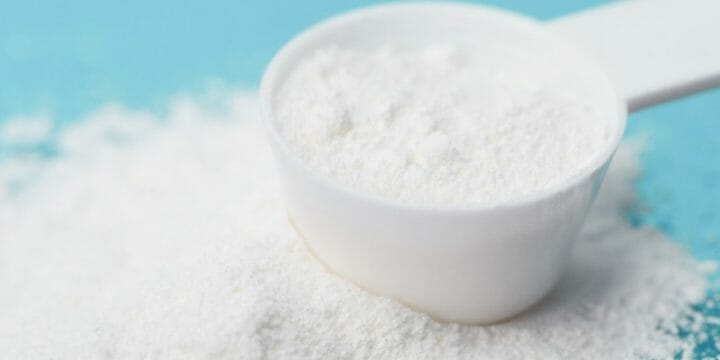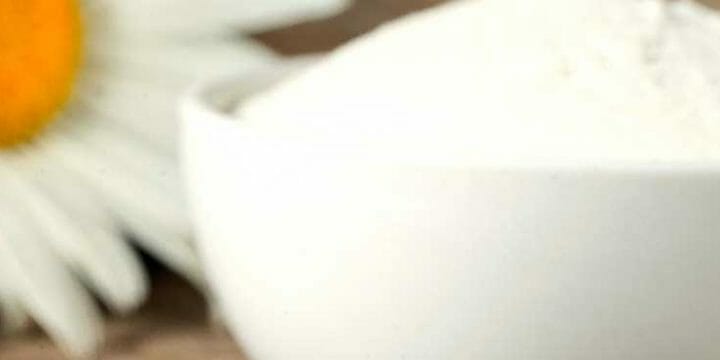There are many misconceptions about protein powders. Some say that they can cause health issues, like heart problems and kidney damage.
But is there any truth behind these claims? I’ve partnered with a dietitian to find out.
Here are our science-backed conclusions.
Quick Summary
- Protein powders are generally safe and beneficial for muscle building and hormone production, with plant-based options like hemp, pea, and brown rice protein being popular choices.
- The safety of protein powders has improved due to third-party testing, ensuring more accurate labeling and reducing the risk of harmful additives.
- Some protein powders previously contained misleading labels and harmful substances like heavy metals, but recent industry changes have addressed these issues.
- In my opinion, while protein powders are a convenient supplement, they should be used responsibly and as part of a balanced diet, not as a sole source of nutrition.
Is Protein Powder Safe?

In general, protein powders are safe.
Your body needs protein to produce hormones and enzymes and build muscles and bones. And many world-class athletes are using powders to improve their performance.
In my experience, protein powders have been a safe and effective way to supplement my diet, especially when training for competitions.
So, why are some people questioning the safety of these protein supplements?
The main reason is that manufacturers of dietary supplements can evaluate the safety of their products themselves.
The FDA allows manufacturers to self-label, which has led to discrepancies.
Studies published in PubMed reveal that some protein powders have misleading labels, substituting advertised ingredients with cheaper alternatives like rice, soy, and chicken protein [1].
Another study found that many powders contain heavy metals, such as arsenic and lead [2].
The silver lining is that these revelations have prompted many companies to adopt third-party testing for their products. Now, most protein powders are evaluated by independent researchers, enhancing their credibility and safety. Consumers are advised to choose supplements verified by third parties for assured quality.
While discussing the safety of protein powders, it's crucial to consider how their effects can vary among diverse groups, such as athletes who may require higher protein intake, elderly individuals who might be more susceptible to digestive issues, or pregnant women who need to be cautious about certain ingredients.
You should also take other precautionary measures that we’ll mention below.
Some Possible Side Effects

Even the highest quality protein powders can have side effects, though these are not common.
It's crucial to consider personal sensitivities or allergies, as many side effects stem from neglecting these factors.
Remember, responsible usage is key to avoiding adverse reactions, rather than the protein powder itself being inherently harmful.
Digestive Distress
Digestive issues mainly occur when consumers don’t consider the ingredients before buying a protein powder:
“People with dairy allergies or trouble digesting lactose [milk sugar] can experience gastrointestinal discomfort if they use a milk-based protein powder.”
- Dietitian Kathy McManus, Director of the Department of Nutrition at Brigham & Women’s Hospital
Digestive issues that may occur include gas, bloating, and cramping. I've seen clients who didn't check for lactose in their protein powders and ended up with digestive distress.
Although these side effects aren’t life-threatening, they’re still uncomfortable.
Avoid them by choosing a plant-based protein powder if you suffer from lactose intolerance or dairy allergies.
Here are a few common plant-based protein powders to choose from:
Whey protein isolate is a good option, too, because it contains less lactose than other dairy protein powders.
Spikes In Blood Sugar

According to the Harvard Health Publishing, some powders have a lot of added sugar. And a lot of sugar increases blood sugar and leads to weight gain [3].
Excessive sugar in some protein powders can be a concern, especially since they're often used for weight loss or heart health improvement.
However, it's important to note that high sugar content is not the norm in protein powders; it's more of an exception.
Most protein powders we’ve tried actually contain very little sugar.
That’s because manufacturers are aware of their buyers’ goals, with weight loss and increased muscle mass being at the top of their list.
Since they won’t achieve these goals with a sugary protein powder, and companies don’t want unhappy buyers, most products don’t contain high amounts of sugar.
Related Article: Is It True That Protein Powder Contains Steroids?
Other Side Effects
You might have heard that a protein powder can cause kidney damage, poor bone health, and even liver dysfunction.
However, these side effects occur only when you consume too much protein for a long time, according to the ISRN Nutrition [4].
Overusing protein powders can lead to health issues, something I always caution my clients against.
You don’t have to worry about these health risks as long as you stick to the recommended dosage.
How To Safely Use Protein Powders

Here are a few guidelines you should follow to ensure you’re consuming protein powder the right way:
- Don’t consume too much protein powder. Stick to the recommended daily protein intake. An average man should consume 56 grams of protein per day, while an average woman should consume 46 grams [5].
- Don’t swap meals for powder. You should still eat protein-rich foods even if you’re using a protein powder. No supplement can replace a nutritious diet. Eat more whole foods and lean meats for a high-protein diet.
- Check Nutrition Facts. Although manufacturers can lie about the ingredients in their powders, it doesn’t mean they will. You should still check Nutrition Facts.
- Choose powders tested by third parties. Third parties, like USP and ConsumerLab, often test supplements. These tests are more credible than those run by the manufacturers themselves.
- Choose a protein that suits you. For example, don’t choose a dairy-based protein powder if you’re lactose intolerant. It’s that simple.
- Opt for natural sweeteners. Avoid buying a protein powder with a lot of added sugar or artificial sweeteners like aspartame and saccharin. Choose only powders with natural sweeteners, such as monk fruit and stevia.
FAQs
References:
- https://pubmed.ncbi.nlm.nih.gov/27072112/
- https://cleanlabelproject.org/protein-powder-white-paper/
- https://www.health.harvard.edu/staying-healthy/the-hidden-dangers-of-protein-powders
- https://www.ncbi.nlm.nih.gov/pmc/articles/PMC4045293/
- https://www.sclhealth.org/blog/2019/07/how-much-protein-is-simply-too-much
- https://lipidworld.biomedcentral.com/articles/10.1186/s12944-020-01384-7
- https://www.sciencedaily.com/releases/2020/01/200123152614.htm
About The Author
You May Also Like






